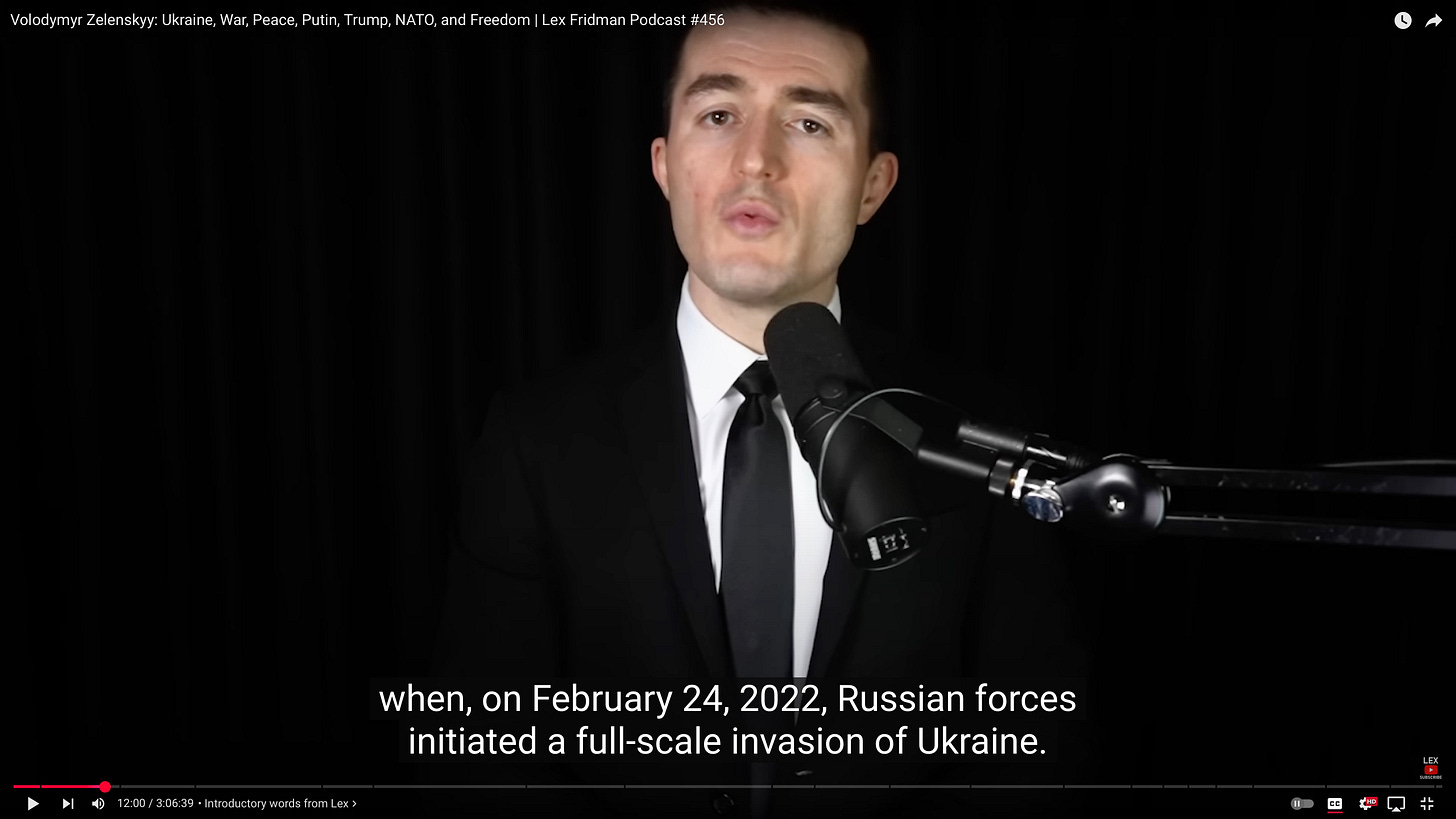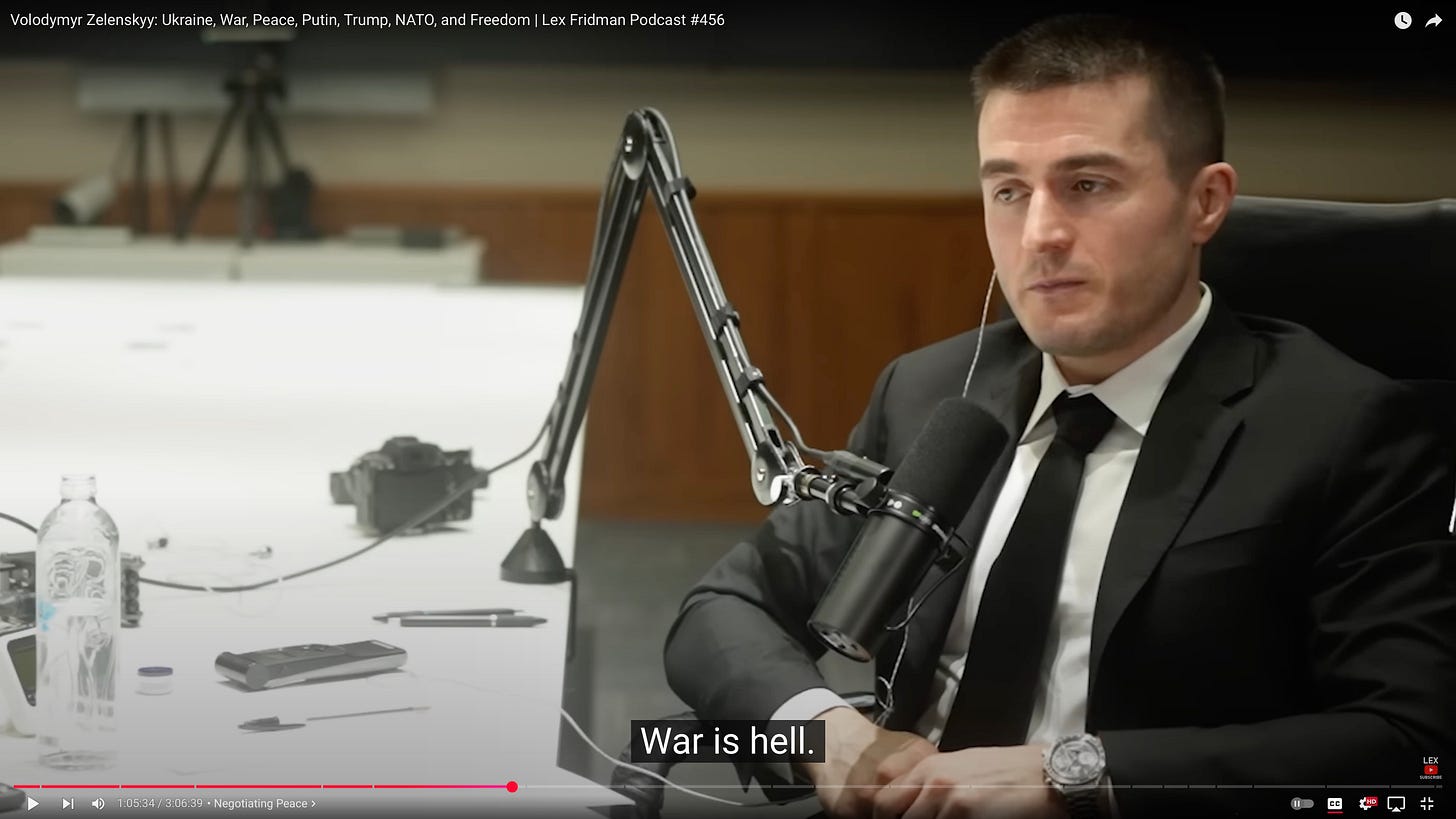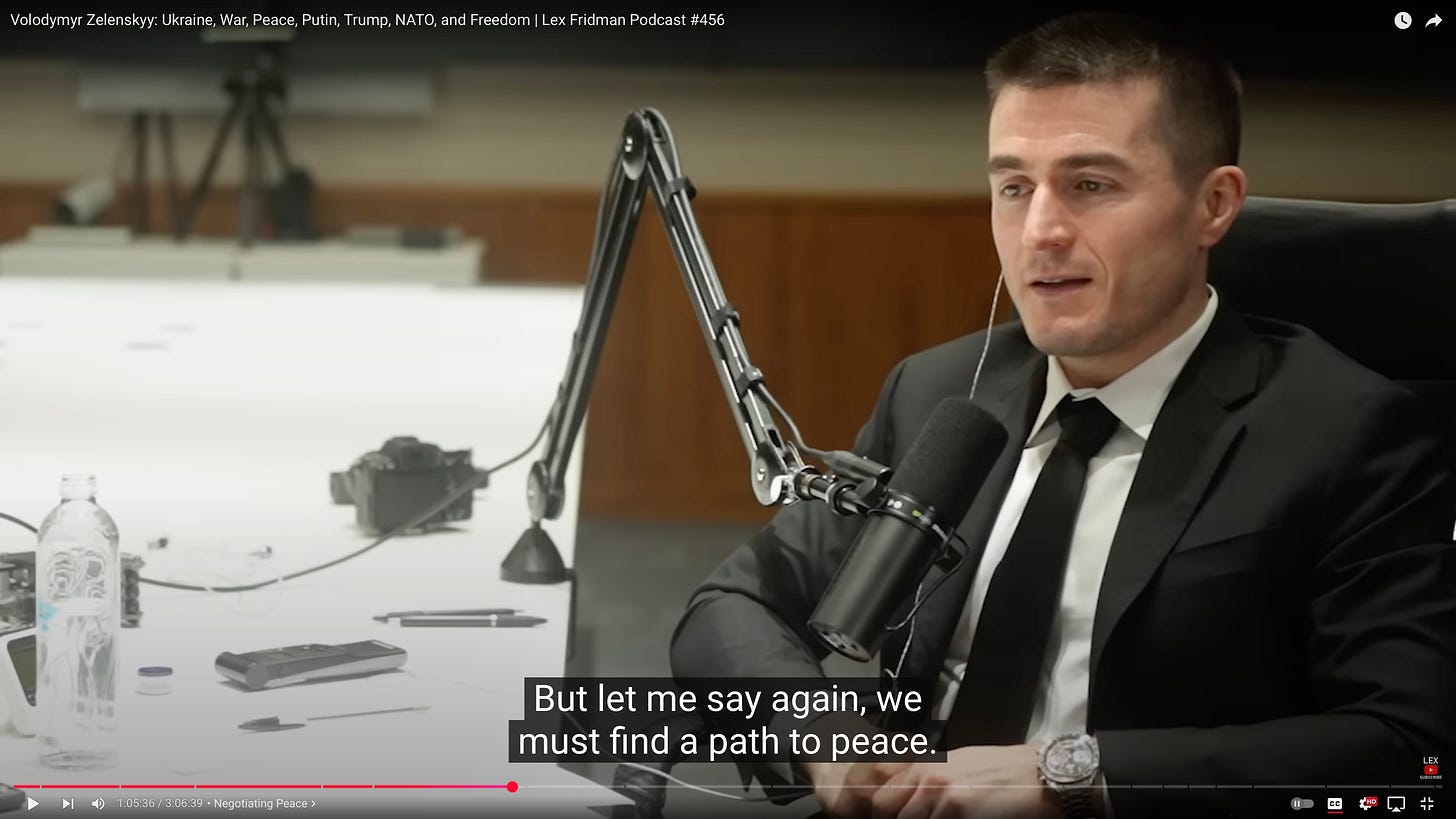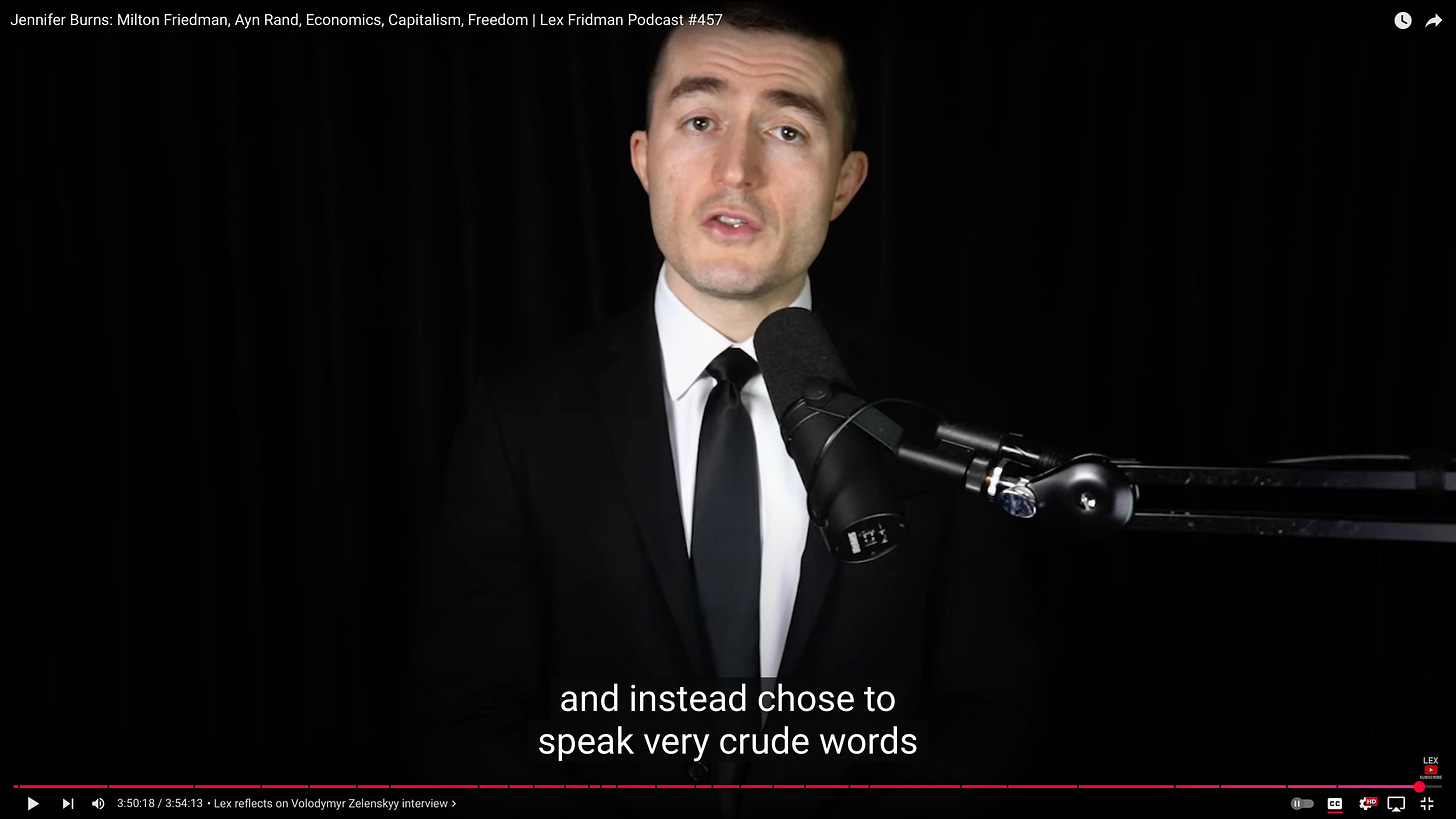Lex Fridman’s interview with Volodymyr Zelenskyy
How President of Ukraine reaches more people and a new audience, despite the interviewer’s russian bias
President of Ukraine Volodymyr Zelenskyy recently had a three-hour interview with American podcaster Lex Fridman.
There was some discussion about whether it is a good idea for Zelenskyy to do this, and what is the role and purpose of Fridman here.
In the end, my opinion is that this interview is a good vehicle for Zelenskyy to get out his and Ukraine’s truth to an audience whom he might not be able to reach otherwise. By January 2025, this interview has 4.7 million views on YouTube.
I wasn’t initially planning to watch this. But it generated enough buzz among my community that I thought I’d still take a look. I’m glad I did, as some interesting themes emerged.
Who is Lex Fridman in the media space of 2025?
Who is Lex Fridman, and why would Zelenskyy speak with him?
For the purposes of this post, Lex Fridman is a podcaster whose show is quite popular in some technology circles, particularly around the topic of AI. His work also resonates among right-wing MAGA. Lex has three kinds of people as guests on his show: technologists, MAGA and russian poison spreaders, and … normal people who don’t fall in the previous two categories (Zelenskyy is also here).
I haven’t watched any of Fridman’s previous shows, so the interview with Zelenskyy was my first one. I have to say I liked Fridman’s style. Leaving aside the problematic russian bias in his questions (more on that below) and just looking at the style, he was soft spoken, to the point, and used clear language instead of hyperbole. I understand that this simply is his trademark style: slightly guide the inteview with his questions, but don’t follow up and assert himself too much, and most of the time, just let the guest speak. This is a different style from a lot of Western media and podcasts that are so amped up and over the top, where the hosts often present themselves and their egos and bad faith agenda, and keep shouting and interrupting, that I just find them cringe and unpleasant.
So, the guests in Lex’s show have a platform to spread whatever they want to spread. Technologists can spread their gospel and discuss technology with Lex (who is maybe not exactly the world-renowned scientist he claims to be, but he does have quite a serious technical background, and breadth and depth in understanding of technology). MAGA and russian poison spreaders can spread whatever current rabid madness their owners need them to. And Zelenskyy can spread his, Ukraine’s, and the free world’s truth across a wide range of topics. This show was 5% Fridman, 95% Zelenskyy.
The media landscape of 2025 in the US is fragmented. Many people now listen to, and believe, Fridman and other podcasters more than traditional mainstream media. I think Zelenskyy chose to speak with him because of two reasons: Fridman’s style that lets the guest shine, and Fridman’s audience whom Zelenskyy simply might not reach otherwise. russia’s distribution of poison and propaganda continues to be powerful all across the world, and it is helpful for Ukraine and friends of Ukraine to have our truth spread through Fridman and other such channels with big distribution, to provide at least a little bit of counter against russian lies.
Some people, sometimes myself included, have a hard time coming to terms with this new reality. How come it is no longer only the mainstream media that sets the agenda and drives public discourse? Who do these new podcaster guys think they are? But such is the new world, and it simply moves on, without caring much about our opinion. We can either whine about it, or play with the cards we are dealt with. Zelenskyy chose the latter: if such is the current media space in this world, let’s just roll with it and make the best of it.
Language and AI voiceover
One unexpectedly interesting aspect of this interview is language: what languages Fridman and Zelenskyy use to communicate, and how the content is translated and conveyed.
In the buildup to the interview, and in his intro and outro segments, Fridman explains how both he and Zelenskyy are fluent in russian, and how in his view this would be the most natural language for them to communicate. For obvious reasons (russian being the language of the aggressor), Zelenskyy does not want to do this, and they use a mix of English, Ukrainian, and russian throughout the interview, with interpreters translating the content into their earpieces. They both acknowledge that interpretation adds a layer of indirection, and when Zelenskyy wants to make an especially salient or touchy point, he switches to russian, so that Fridman and russian viewers would understand him directly.
Fridman somewhat understands why Zelenskyy does not want to speak in russian all the time, but in my view he does not fully and honestly acknowledge Zelenskyy’s reasons for this. Whether Fridman truly does not get it, or he gets it but chooses to not be honest about it, is hard to say based on the video.
Fridman’s video, linked above, is published with four voice tracks: Ukrainian, English, russian, and original. If you haven’t recently checked out AI-generated voice technology, the interview is interesting to watch for this reason alone. For both Zelenskyy and Fridman, the voice track is AI-generated in the respective language in their own voice when they are not speaking the language of the voice track, and is otherwise the original voice. The “original” voice track (choose “English (United Kingdom” on Youtube for this) is the original unmodified mixed-language voice.
Some listeners have said that the AI-generated voice track seen here has an unpleasant uncanny valley effect: you hear the person speaking in their own voice, and the text flows fluently, but the voice is not in sync with the video, and how their lips move. I am convinced that AI technology will improve in the near future such that the lip movement will be matched to the AI-generated voice, and it will be harder to tell whether the video is original or AI-modified. Deepfakes will flourish.
I chose to watch the video with original voice track and English subtitles, because I wanted to see the humanity and (sometimes lack of) emotions for both sides, and that is best conveyed in the original voice.
Office of the President of Ukraine has also published this interview on their Youtube channel, with only the (partially AI-generated) Ukrainian voice track, and English and Ukrainian subtitles (obviously no russian). I think one of their reasons is to guard against any possible content modifications by Fridman, though it seems so far that Fridman has acted in good faith and not modified anything, so the two versions are identical in content. There was one mistranslation, which Fridman has acknowledged and owned.
What the interview is about
The interview is a broad discussion of many topics around russia’s invasion of Ukraine, as well as current Ukrainian politics and Zelenskyy’s own person and family. To those of us who have paid attention, there’s not much new here in terms of facts that we didn’t already know.
I’ll just mention two: when russia invaded Ukraine in 2022, it also happened from Belarus territory. Zelenskyy had a phone call with Lukashenka who said he couldn’t do anything about it, and would understand if Zelenskyy bombed some Belarus oil refineries in retaliation. Which Zelenskyy has chosen to not bomb until now. (But note how the russian oil facilities are burning.)
The second nugget is when they talk about corruption in Ukraine, which Zelenskyy never denies, but he broadens the question about what is corruption, and what are the boundaries around corruption and lobbying. He discusses how during the start of full-scale invasion, Ukraine managed to evacuate its cargo plane fleet into Europe. When military aid started to arrive from the US, a lot of it was by air. Moving military cargo by air is expensive, and Zelenskyy offered to use Ukraine’s cargo plane fleet for this, which would be cheaper than the definitely high-quality but expensive US fleet. But this request was denied, and Zelenskyy implies that it was because some people in the US made money from this. Zelenskyy asks, is this corruption, but doesn’t explicitly answer it.
The biggest value of this interview for me is simply to observe Zelenskyy speak as himself, almost uninterrupted and unguided, for over two hours, and to get a fresh snapshot of how things are for both Ukraine and for himself in early 2025. There aren’t that many occurrences where that actually happens, especially lately.
I would even go so far as to recommend you watch this entire interview if you are a friend of Zelenskyy and Ukraine, despite Fridman’s somewhat russian bias, which is a bit annoying but doesn’t distract you too much, as Zelenskyy uses all the questions as an opportunity to tell his own story and truth.
Is Lex Fridman spreading russian poison?
The theme of this newsletter is russian poison, so I’ll now examine the problems with Fridman’s position, and why I say he has a russian bias.
Fridman has no problem stating some basic facts about russia’s aggression. In his intro he clearly states that russia invaded Ukraine.
I mention this because some of the worst russian propagandists in the West have trouble acknowledging even this basic fact, and aggressively lie about russia’s invasion.
Fridman doesn’t exactly lie like that, but neither is he too interested in truth about russia’s aggression and crimes. He has one message he consistently repeats throughout the interview: war is a tragedy and hell, and the way out is for Zelenskyy, Trump, and putin to sit together and agree about a path to peace.
Fridman has difficulty putting 2 and 2 together, and he cannot acknowledge that it is exactly the russian invasion that is causing all this tragedy and hell, and it is russia with its crimes who is fully responsible for this.
There are two lenses which you can use to analyze russia’s invasion of Ukraine, and they quite spectacularly collide in this interview, with Fridman clearly representing one and Zelenskyy the other.
From the viewpoint of international law and clear-eyed analysis of russia and its imperialism, which Zelenskyy represents, russia’s invasion of Ukraine is entirely illegal, and this should really be the end of discussion. There’s nothing to talk about. russia has no claim to a single centimeter of Ukrainian land. When a criminal invades your house, rapes your daughter, kills your wife and takes all your stuff, you don’t “negotiate” with them. You call the police and have them deal with the invader and their crimes in the court of law and the justice system–if they are lucky and you don’t shoot them as self-defense yourself first.
Fridman represents a different world view where concepts like “truth”, “justice”, “morality”, “freedom”, “rules”, “democracy”, and “law” don’t really exist and matter, or even if they do, everything is relative, fungible, and open to the highest or strongest bidder. It’s free market logic applied to geopolitics, and russia has invested billions of cash and decades of time into propaganda to make the people of free world see things in this fungible way, rather than fighting for their freedom against obvious tyranny and slavery which russia represents. In this world, russia’s imperialism, aggression, and crimes don’t matter, and are something that can be hidden, justified, whitewashed, and negotiated away.
These two world views are both clearly represented in this interview. I’ll say again to Fridman’s credit that although he represents the world view that is useful for russia, he doesn’t assert himself or this view too aggressively here, and lets Zelenskyy speak most of the time.
Update: Fridman’s follow-up
On January 20, Fridman posted another, unrelated interview. At the end of it he has a 15-minute segment where he follows up on his interview with Zelenskyy and shares more thoughts. Here is a link to it. Zelenskyy followup starts at 3:36:06.
The point he wants to get across here is that he offered Zelenskyy an opportunity to plea for peace, but Zelenskyy did not use it because he did not talk very nicely about Putin, and instead talked about russia’s aggression and crimes.
This doesn’t change anything that I wrote above. Fridman has a russian bias and a mercantile world view devoid of morals and values. I do find it curious that Fridman was not satisfied with the Zelenskyy interview standing on its own, and decided to have this kind of follow-up. As Fridman says himself in the follow-up, he got mixed feedback about the interview, and people accusing him of being both a Ukrainian and russian shill. Whenever that happens in a high-stakes environment, it indicates that you fundamentally got everything right, and the interview was strong and good just like that, without any follow-up.
This follow-up segment raises many interesting questions. Why did Fridman do it? Did anyone ask him to? (Fridman says explicitly in the follow-up that he works alone, but of course russians always lie, so these words don’t mean very much.) What does Zelenskyy’s office think of this? Would they have agreed to the interview, knowing that there will be this kind of follow-up? Does this increase or decrease the probability of any future Fridman interviews with Zelenskyy?
I don’t have factual answers to these, and do not wish to speculate. I will leave these as a home exercise to you, dear reader.






I agree with nearly everything you wrote, and particularly about how Zelenskyy's ability to talk uninterrupted was a major highlight. I would also recommend to other readers to watch the interview in the original audio with subtitles. I originally started it with the Ukrainian audio and found the AI dubs to be very distracting.